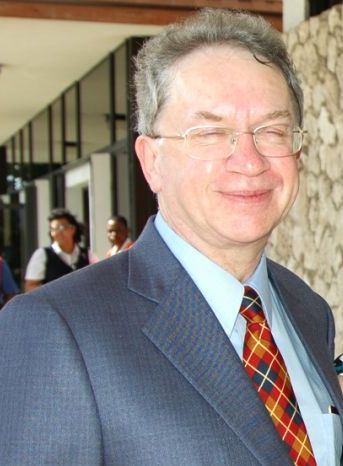Archive for December 3rd, 2009
Former public bank manager sets up private firm
(CNS): The former general manager of the Cayman Islands Development Bank has set up in private practice and says he aims to help small business with a range of services. Ralph Lewis said that his consulting and counselling agency Lewis Consulting Services (LCS) will offer reviews of existing businesses looking at Operational Efficiency, Customer Service, Core Systems, Inventory Management and Financial Discipline to improve business performance in what are challenging times for all small medium enterprises (SMEs).
"The foundation for my new business venture is based on integrity and confidentiality, which are the major components for consulting and counselling", said Lewis, who said he was qualified in banking, financial counselling and operational efficiency. "SMEs globally have been struggling to survive in the current economic climate and those domiciled in the Cayman Islands are also experiencing their share of challenges. The recommendations provided by LCS will offer affordable tools and techniques which will increase the survival rate of these businesses. "
Lewis, said he has been involved in banking for the last 30 years, regionally and claims to have been instrumental in improving operational efficiency, customer service and core system conversions in various institutions across the Cayman Islands for over 25 years. "This level of expertise and experience can only add value to the business operations consulted by LCS", Lewis added saying his long term plans include expansion within the Caribbean region through partnerships with established development agencies.
An additional service offered by Lewis will be personal financial counselling. In the near future, he will be teaming up with local media houses to produce a number of programs on budgeting and personal debt management.
"The current economic crisis has affected the disposable income levels for individuals thereby placing tremendous strain on financial resources and relationships." Lewis said his financial counselling tools and techniques can provide much needed assistance and direction to individuals attempting to gain control over their finances and in turn their lives around.

UK OT minster admits strains ahead of meeting
 (CNS): The increasingly strained relationship between the United Kingdom and a numberof its overseas territories will be in the spotlight next week when the Cayman Islands premier McKeeva Bush and ten other leaders from other overseas territories gathering in London to meet with the OT minister, Chris Bryant, at the Overseas Territories Consultative Council. Bryant said a lot had happened since 2008, and with a number of difficult issues to address there was much to discuss with the OT elected leaders.
(CNS): The increasingly strained relationship between the United Kingdom and a numberof its overseas territories will be in the spotlight next week when the Cayman Islands premier McKeeva Bush and ten other leaders from other overseas territories gathering in London to meet with the OT minister, Chris Bryant, at the Overseas Territories Consultative Council. Bryant said a lot had happened since 2008, and with a number of difficult issues to address there was much to discuss with the OT elected leaders.
“Much has happened since territory leaders gathered in London 12 months ago. Developments across many of the Territories, not least in the Turks and Caicos Islands, and the economic and financial services challenges that many of them face, have, in some cases, put our relationship under strain. We’ve got a great deal to discuss and difficult issues to address,” the FCO minister stated.
“I’m looking forward to open and frank discussions and to working with Territory leaders to resolve those issues and to strengthening our relationship. We value our relationship with the Overseas Territories highly and are keen to maintain that bond of friendship, even if at times we have to be critical friends.”
The eleventh meeting of the Overseas Territories Consultative Council (OTCC), a key event in the British Government/Overseas Territories calendar, takes place on 9 December and will be Chris Bryant’s first Council. Discussion will reportedly cover a range of topics, including the UK/Overseas Territories relationship; economic issues in the light of the global crisis; financial services regulation following the G20 Summit; human rights; public sector reform; the environment; and immigration issues affecting the Territories.
Premiers, chief ministers and their equivalents from Britain’s Overseas Territories will be attending as well as UK ministers, including Michael Foster MP, the Parliamentary Under-Secretary of State at the Department for International Development; Huw Irranca-Davies MP, the Minister for the Natural and Marine Environment, Wildlife and Rural Affairs at the Department for the Environment, Food and Rural Affairs; and Meg Hillier, Parliamentary Under-Secretary for Identity at the Home Office.
This year, at the request of overseas territory leaders, a forum is being held the day before the Consultative Council, on 8 December, to review the 1999 Government White Paper “Partnership for Progress and Prosperity – Britain and the Overseas Territories”. The White Paper established the principles that have guided the relationship between the UK and Territories since 1999.
The territory leaders attending this year’s OTCC are Osbourne Fleming, Chief Minister , Anguilla; Ewart F Brown, Premier, Bermuda; Ralph T O’Neal, Premier, the British Virgin Islands; McKeeva Bush, Premier, the Cayman Islands; Dick Sawle, Member of the Legislative Assembly, the Falkland Islands; Reuben Meade, Chief Minister, Montserrat; Michael Warren, Mayor, Pitcairn Islands; Cyril Gunnell Councillor, St Helena; Conrad Glass, Chief Islander, Tristan da Cunha; and Ann Miller, Councillor, Ascension Island.
Knives seized in taxi ‘war’
(CNS): Following complaints by local taxi drivers that the police have been harassing them, the RCIPS have not only denied that they have been unreasonable but have expressed serious concerns that drivers have been arming themselves as a result of a growing tension between George Town’s taxi businesses. Superintendent Kurt Walton said that police seized nine weapons from taxi drivers, including a machete and knives, in contravention of the transport law during an operation in November.
The drivers, however, have complained that the police have conducted stop and searches of their vehicles when they were carrying tourists. They have reported that officers were rude and aggressive and had asked passengers to get out of the taxis while they looked for offensive weapons — giving the wrong impression to visitors to the island.
Walton, on the other hand, insisted that his officers were not heavy handed or aggressive in their approach and were doing their job. "I disagree with that. We have taxi drivers who are ambassadors for our country driving around with weapons,” he said.
He added that the officers involved had used discretion when seizing the weapons and had not taken anyone into custody, though they had a right to do so. Walton said that the RCIPS had not yet made any arrests over the knives, even though several drivers had clearly broken the law by carrying them in their cabs.
The operation to stop and search the taxis and seize the knives came after the Public Transport Board had reported concerns about drivers who were fighting, but the reasons were not specified. Walton said police were told by the PTB that it was concerned the dispute had escalated, resulting in drivers arming themselves.
Walton also said that an officer had found a machete in a taxi following a routine traffic stop. That, coupled with the PTB’s concerns, resulted in the stop and search operation which Walton said was aimed at preventing violence. He said that during the operation some eight weapons were found and one cab driver was charged with driving without insurance.
He insisted that the operation was about preventing crime not harassing people, and whatever the taxi drivers’ complaints were regarding the tourists’ impressions of the operation, the idea of a full scale all out fight in the centre of George Town was far more of a concern – something he said his officers had likely averted. The senior officer also said the vast majority of drivers had been very cooperative and the police had succeeded in pushing the message that it is against the law for drivers to carry weapons when driving the taxis.
Walton said he was unable to confirm if there had been any actual fights between drivers reported to the police or if drivers had reported any other incidents of threats against them while doing their job. He said that if the drivers were fearful of being the victims of crime, it would have been more sensible for them to raise their collective concerns with the PTB, which could then have met with police to see how they could be addressed, rather than arming themselves.
CNS has also contacted the PTB to establish the nature of the reported dispute among drivers and is awaiting a response.
Expert witness finds victim’s blood on inmate’s belt
(CNS): The science of DNA was the focus of the court room on Wednesday during day seven of Randy Martin’s trial for the murder of Sabrina Schirn. An expert witness told the court that the DNA in the blood taken from a glove found near to the murder scene, which had traces of Martin’s DNA, and a belt belonging to the defendant was Sabrina Schirn’s, News 27 reported. Dr Kevin Noppinger, however, also told the court that while there was a trace of her blood on the ignition of the car that Schirn drove before she was murdered, he did not find any of the defendant’s DNA in that car.
During the cross examination of the witness, defence counsel asked if traces of vegetable matter, such as a stain from the juice of a tomato, could give a false positive in blood testing. The doctor noted that, while it was possible for a fresh stain to give a false positive result, it could not happen with stains that were aged and dry.
Noffinger also said he had tested a number of items of clothing that belonged to Martin, but it was only on the belt taken from his cell at HMP Northward where the blood of 21-year-old Schirn was found.

Duty may impactXmas trade
 (CNS): Goods imported into the Cayman Islands could be reflecting government’s duty increases as early as in one week if the bill passed in the Legislative Assembly on Wednesday is fast tracked to the gazette stage. That means the increases which will result in price rises at the till could have a direct impact on Christmas shoppers. The changes in fees under the amendments to the Customs tariff law 2002 include the two percent hike on most items that carry a levy, as well as an increase in the package tax and the introduction of an environmental tax on imported used cars.
(CNS): Goods imported into the Cayman Islands could be reflecting government’s duty increases as early as in one week if the bill passed in the Legislative Assembly on Wednesday is fast tracked to the gazette stage. That means the increases which will result in price rises at the till could have a direct impact on Christmas shoppers. The changes in fees under the amendments to the Customs tariff law 2002 include the two percent hike on most items that carry a levy, as well as an increase in the package tax and the introduction of an environmental tax on imported used cars.
Part of the government’s revenue raising measures in the 2009/10 budget, most of which come into effect in January, the duty changes will be implemented as soon as possible. As a result, consumers who leave their shopping until the last minute could be paying considerably more for their Christmas list this season after an already tough year.
The bill increasing duty rates was one of five passed in the House on 2 December including the bill which introduces an annual licence fee for money transfer companies, as well as a 2% charge on each transaction where money is sent out of the country via a money service business. The 2% is capped at $10, and with no implementation date this new fee will also come into effect as soon as it is gazetted, which could mean before Christmas.
Legislators also passed three bills affecting the financial sector, including the Public Recorder Law, which provides for the increase in a number of fees associated with registering documents. The Monetary Authority Law not only increases fees paid to CIMA for certain regulatory services but also allows government to take as much as $10 million from CIMA for use in the general treasury, and the Companies Law, which will, among many other things, increase the cost of registering a company in the Cayman Islands. The premier, in his role as minister of finance, told the LA that this bill was expected to raise some $20 million for the treasury.
During the presentation of the bills, the opposition questioned whether they would have the desired affect in balancing the country’s budget as hoped. The PPM member for George Town, Alden McLaughlin, also asked whether, given the current situation with the world’s economic turmoil, it was a good time to see how government earnings were doing so far. He asked if the minister could provide an update on how revenue and expenditure were performing as the country was almost at the half way point in the fiscal year.
“We invite the premier to the House with an update of the indications as to how well the budget projections are performing. We believe it is important to understand how likely it is the targets will be met,” McLaughlin said. He warned of the dangers of not closely monitoring revenue performance, something which he said his administration had experienced when they learned how the projections they had been given had fallen far below expectations.
McKeeva Bush, however, criticised the opposition member for asking and said that he could not provide an update as only a few of the bills had been passed that were expected to boost the government coffers.
During the course of the day the war of words over the budget between government and opposition escalated as the PPM Members pointed out that, while the new laws may not have had time to impact government revenue and spending, they were not the only source of government revenue generation and government had been hopefully earning as well as spending money over the last six months, which could give an indication of whether or not it was on target.
The premier accused McLaughlin of politicking and hypocrisy as he refused to give an update on how revenue and expenditure was doing at that moment. Bush said the bulk of government revenue came in between January and March and that’s when he would update the country. Bush rebuked the MLA for raising the issue, as he said it was him and the leader of the opposition that had spent all the money that had put the current government in the serious and challenging situation. “Don’t come in this House beating up the government,” he said, maintaining that they were the ones to blame for the financial mess.

Anglin rejects TJI legal claim
 (CNS): The minister for education has said that government will fight the law suit filed by Tom Jones International (TJI) as, he stated, it does not owe the payments regarding the contract on the two high school contracts as claimed. TJI has filed a writ in the Cayman Islands Grand Court claiming close to $3million, which the general contractor says was due before the 19 November and represents work certified by the quantity surveyor and architect at both the John Gray and Clifton Hunter sites. Rolston Anglin, however, said the claim was outside of the contract obligations.
(CNS): The minister for education has said that government will fight the law suit filed by Tom Jones International (TJI) as, he stated, it does not owe the payments regarding the contract on the two high school contracts as claimed. TJI has filed a writ in the Cayman Islands Grand Court claiming close to $3million, which the general contractor says was due before the 19 November and represents work certified by the quantity surveyor and architect at both the John Gray and Clifton Hunter sites. Rolston Anglin, however, said the claim was outside of the contract obligations.
Speaking in the Legislative Assembly on Wednesday, the minister said the claim related to an extraordinary payment. “The government’s position is that these demands are not due or payable and the writ will be defended vigorously,” Anglin told his fellow legislators.
He also reiterated the government view that TJI had wrongfully abandoned the projects in breach of contract when the general contractor walked off the two job sites at the beginning of last month. Anglin said the notice of termination given to TJI last week came into effect at 4:00pm Wednesday, 2 December, and plans were now being worked out on how government would finish the schools. “The termination of TJI was necessary, valid and absolutely justified. It remains CIG’s position that all certified payments have been made,” he added.
The TJI writ claims that the contractor is owed $2,947,818.54, which represents work on the Clifton Hunter site (certificate 17a for $833,575.89) and for work on the John Gray Site (certificate 15a for $2,114,242.65), both of which were certified, the contractor says, on 20 October in accordance with the terms of the contract by the official quantity surveyor. TJI says that therefore it is seeking the total sum as well as costs and interest payments calculated from 19 November.
Stating that government does not believe the claim is within the terms of the contract, the minister said the main focus was for the government to ensure that the key educational goals for students would be met. “Plans are being developed in consultation with experts, to complete the school projects in as cost effective and timely manner as possible,” the minster said. “In so doing the government will be seeking to mitigate any losses caused by the breach of contract.”
Anglin did not elaborate on what those plans were likely to be but said the public would be informed as soon as the government was in a position to detail them. He did not say whether government would take on the project via public works, directly employing sub-contractors, or if it would bring in another general contractor.
The dispute between government and TJI began under the previous administration and escalated recently to an impasse when TJI said it did not believe the government had the cash to finish the two high school project and demanded payment up front as well as some form of bond or surety. TJI and government are also at odds regarding change orders and overruns, which the contractor claims are in excess of $15 million more than 10% of the entire cost of the two schools a figure broadly disputed by government.

Jack leaves with “fond memories” he says
 (CNS): Arguably one of the most controversial governors ever to serve in the Cayman Islands, Stuart Jack left the Cayman Islands on Wednesday lunch time (2 December) as his tour of duty ended. Acknowledging that he and the elected officials did not always see eye to eye, Jack reportedly said he was leaving the Cayman Islands “with many fond memories” at a small reception at the airport. Following the governor’s departure, the politicians who attended the lunchtime departure reception returned to the Legislative Assembly and made no mention of the UK representative’s exit from Cayman.
(CNS): Arguably one of the most controversial governors ever to serve in the Cayman Islands, Stuart Jack left the Cayman Islands on Wednesday lunch time (2 December) as his tour of duty ended. Acknowledging that he and the elected officials did not always see eye to eye, Jack reportedly said he was leaving the Cayman Islands “with many fond memories” at a small reception at the airport. Following the governor’s departure, the politicians who attended the lunchtime departure reception returned to the Legislative Assembly and made no mention of the UK representative’s exit from Cayman.
Jack and his wife, Mariko, left on a Cayman Airways flight, but before they left an informal, but reportedly less than fond, farewell reception was held at the Owen Roberts International Airport VIP lounge. Premier McKeeva Bush did thank Jack and his family and told Mariko Jack, the governor’s wife, that she had made a difference during her time in Cayman. “You were always a gentle lady, and I appreciate your contributions,” Bushadded, though he did not say the same about her husband.
Jack came to Cayman in 2005 and within a short period was clashing with the country’s politicians, long before he established the Tucker Commission to enquire into the conduct of the former minister of tourism, Charles Clifford, and documents he had given to the media. Former government ministers all spoke recently about the governor’s attitude, which they said was one of derision towards them. The previous administration said that Jack had made it clear to them he had little time for the members elected by the people and considered them all potential crooks.
His mantra regarding good governance (which appears to have been very selective) and his presidingover the discredited special police operations Tempura and Cealt and the UK officers associated with the investigations, also saw politicians and the wider public question his judgement as he spent millions and millions of dollars on a failed corruption investigation.
The UK’s next choice for Cayman is Duncan Taylor, who is expected to arrive in January, and he has already used the situation in the Turks and Caicos as a warning signal to those he will be working with in his new posting when he arrives in the Cayman Islands.